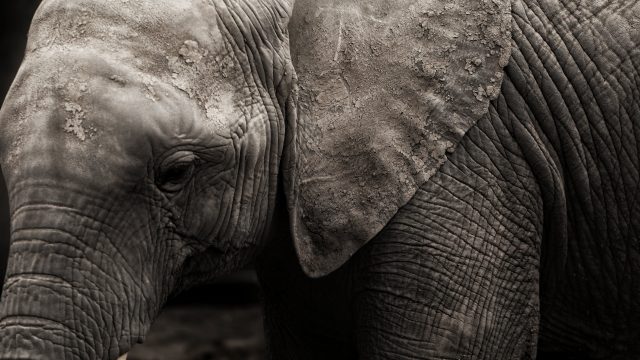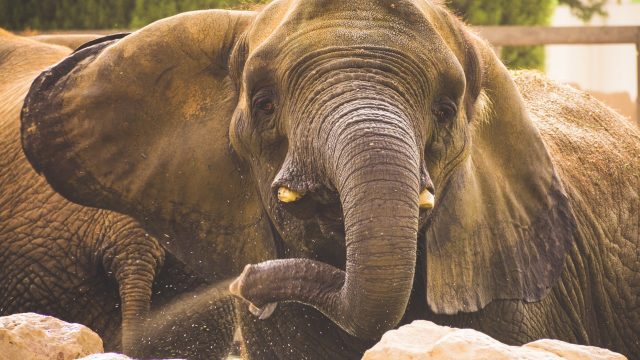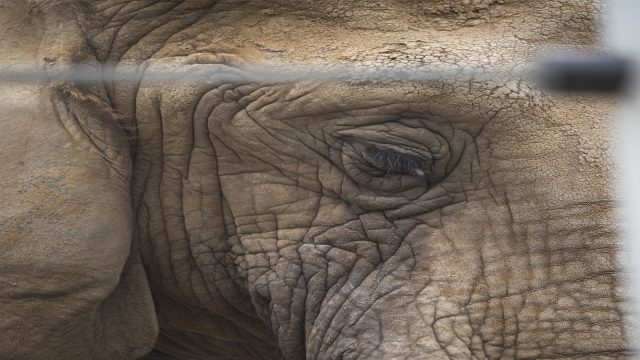
Captive Elephants Need Better Protections
Any time elephants and humans share the same space, whether in a zoo, at a circus, or at a county fair, elephants are likely to suffer. According to the Bureau of Labor Statistics, elephant handlers who utilize the “free contact” system of elephant management have the highest risk of fatal work injury for any profession. Free contact is characterized by the use of sharp bullhooks or other weapons intended to inflict pain and fear. Handlers use the bullhook to beat, jab, hook, poke, and prod elephants in the most sensitive areas of their bodies. When the public is present, the mere presence of the bullhook acts as a threat of pain the elephant will endure if she doesn’t perform as commanded. This barbaric conditioning process begins when the elephants are mere infants. Already in 2015:
- An investigation has been opened into UniverSoul Circus for alleged cruelty to an elephant at a show in Atlanta.
- The Pittsburgh Zoo & PPG Aquarium was cited by the USDA for using biting dogs to control elephant behavior.
- Asheville, North Carolina instituted an aggressive policy change to prohibit circuses from using exotic animals in the city-owned arena.
- San Francisco is considering an ordinance to ban the exhibition of exotic animals.
- Hawaii stands poised to pass the first state-wide legislation to ameliorate abuse of wild and exotic animals used in circuses.
- Just this week, Santa Monica, Calif. passed a ban on the exhibition of exotic animals.
In addition to abusive handling, elephants also endure premature maternal separation; lack of adequate enrichment, space, and socialization; and perpetual confinement in chains on unnatural surfaces during transport for traveling shows or while backstage at performance venues. These conditions are associated with lifelong physiological and psychological damage that make elephants unpredictable and prone to aggression:
- 9/10/2014: an elephant fatally crushed the founder of an elephant facility in Hope, Maine.
- 10/11/2013: an elephant fatally trampled a handler at the Dickerson Park Zoo in Springfield, Mo. while he was coaxing the elephant from one part of the enclosure to another.
- 8/26/2013: an elephant attacked a visitor at a roadside zoo in Williston, Fla. whose resultant critical injuries required her to spend nearly two months in the hospital.
On the other hand, the “protected contact” method of handling elephants is characterized by positive reinforcement: handlers don’t use bullhooks or other weapons, never share unrestricted space with the elephant, and never force the elephant to submit to the handler’s demands. This method is employed by the only two reputable elephant sanctuaries in the United States (the Performing Animal Welfare Society in California and The Elephant Sanctuary in Tennessee) and by zoos accredited by the Association of Zoos and Aquariums (AZA).
ALDF is working toward the day when holding elephants captive will be a relic of the past—in the meantime we are fighting to ensure captive elephants aren’t subjected to additional abuse with cruel weapons of behavior modification. Los Angeles, Oakland, Miami Beach, and dozens of other localities across the U.S. have enacted ordinances to ban the use of bullhooks or the use of elephants and other exotic animals in entertainment all together. ALDF is working hard to ensure more jurisdictions pass laws to ban the cruel use of bullhooks and other weapons, to prohibit prolonged chaining and caging, and to eliminate the use of wild and exotic animals in entertainment altogether.
We hope you will join us by refusing to attend any entertainment events where animals are forced to perform, and by letting legislators know that you will not tolerate such cruelty in your community.
Focus Area
Issues
Related
-
Animal Advocates Urge USDA to Withhold License from Troubled Puerto Rico Zoo
In a letter to the USDA, the Animal Legal Defense Fund and others explain the zoo has repeatedly violated standards of the Animal Welfare ActJune 2, 2021 Press Release -
Animal Advocates Urge Puerto Rico Officials to Take Action on Troubled Zoo
Animal Legal Defense Fund letter asks Puerto Rico governor to investigate illegal treatment of endangered species and other animals at Dr. Juan A. Rivero National Zoological ParkDecember 16, 2019 Press Release -
The Animal Legal Defense Fund Mourns Beulah and Karen and Fights for Change in Massachusetts
The Animal Legal Defense Fund is deeply saddened by the death of elephants Beulah and Karen and is committed to supporting legislation pending in Massachusetts to prohibit the use of elephants and certain other wild animals used in circuses.September 19, 2019 News



